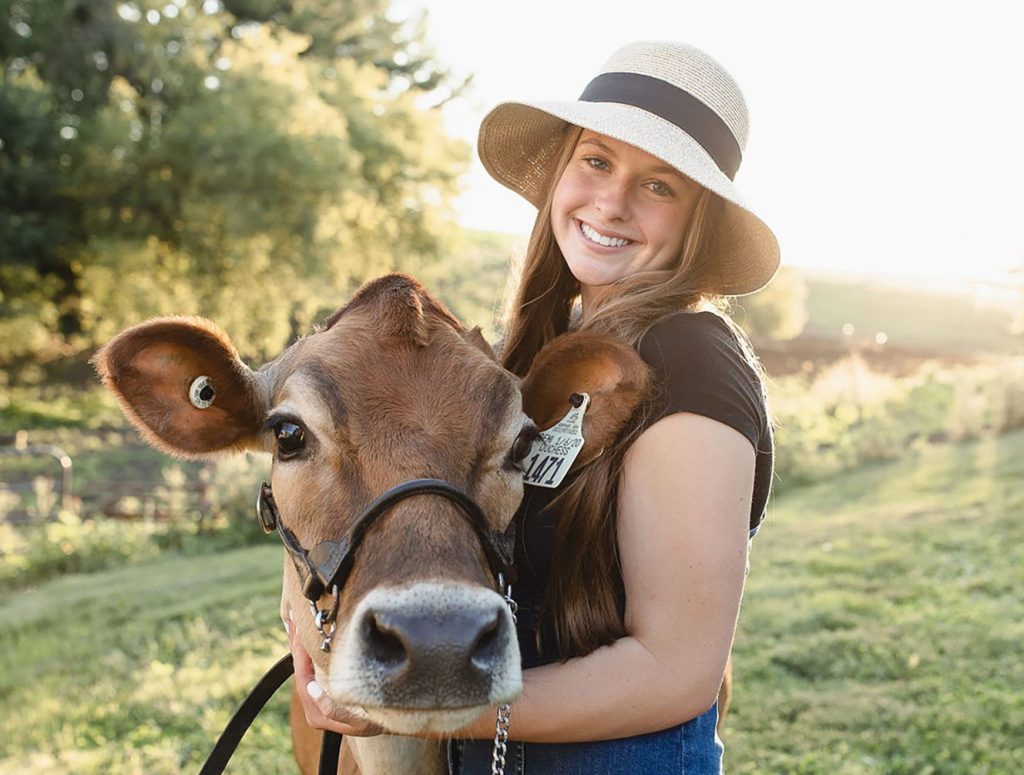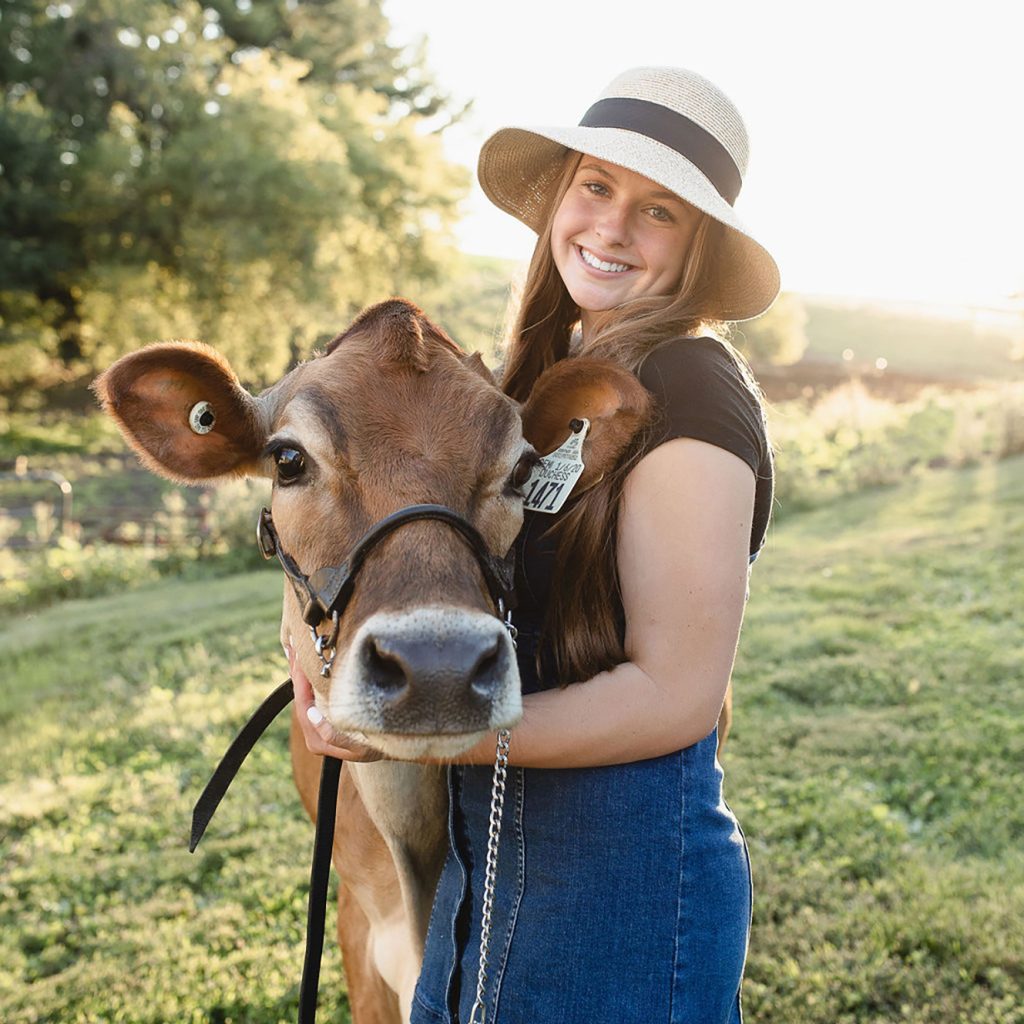
By Jim Massey
Freelance writer
It didn’t take Kelsey Hardy very long to dive into dairy research after she enrolled in the UW-Madison Department of Animal and Dairy Sciences.
In fact, it was during the first semester of her freshman year that Hardy began working on a research project with Brittney Davidson, a Ph.D. student in the department, and Jimena Laporta, an associate professor of lactation physiology. Hardy was paired with Davidson as part of a mentorship program and jumped on the chance to work in Laporta’s.

“She and I just got along so well so quickly, so I asked her if she’d be interested in joining the lab,” Davidson recalls. “Her response was, ‘Yes, I’d love to.’ Then it naturally turned into giving her a little bit more work each semester, and now she comes back and asks to do even more. She says she’s honored to be part of the lab, but I’m just glad she has time to put us into her schedule.”
That schedule is a busy one for Hardy, who is now in the second semester of her sophomore year. Besides her regular course work, she is working on the research project, is a member of the dairy judging team, and is a member of the Association for Women in Agriculture, Badger Dairy Club, Collegiate Farm Bureau, and Saddle and Sirloin Club. She also worked in stints as the Animal and Dairy Sciences Department student office manager, and as an office assistant at the Military Ridge Veterinary Service in Dodgeville.
Besides those activities, she has stayed involved in FFA and as the chairperson of the Wisconsin Junior Holstein Association’s Junior Activities Committee.
It was during her work at the veterinary clinic where she found her passion for large animals and veterinary medicine. Hardy didn’t grow up on a farm, but showed dairy cattle with the help of family friends. She also spent a lot of time on her grandparents’ farm, just 20 minutes from her family’s home in Dodgeville.
“While at the vet clinic I would do ride-alongs, and I would learn about in-depth health issues and observe surgeries,” she says. “It was very interesting to me. I have a passion for large animals, and I think that passion is something you’re born with. Not a lot of people want to get up and milk their show cows at 3 a.m. To me, it’s fun.”
Hardy visited several colleges before deciding on UW-Madison.
“I really wanted to get a good education in dairy, and UW-Madison has dairy cattle here on campus,” she says. “There are just so many things I didn’t know, and there are so many areas of dairy to study. The cost was also important to me, so the in-state tuition helps out. It was definitely the right choice.”
Hardy’s early dive into research earned her the Farrington Undergraduate Research Award. The award provides a $2,000 stipend plus $500 in flexible funds for research supplies and other project-related activities. The Farrington Award is based on independent scholarly activity, academic performance and the merit of the student’s undergraduate dairy research project.
Laporta says it is quite unusual for a student to be involved in research as early as Hardy joined the lab.
“Engagement that early is not very common,” she says. “But it is very important for undergraduate students to put their names on some research projects. It’s super valuable to get that in their resume. These opportunities to get involved in research early on raise the bar for students.”
Hardy is a pre-veterinary student, so getting these experiences on her resume should give her a leg up in the heavy competition to get into vet school, she says. She is also open to other options, if she determines vet school isn’t for her. She will have a summer internship as an artificial insemination technician at CentralStar Cooperative, so will also consider a career in dairy reproduction. She might also consider graduate school.
“I’m continuing to try different areas as an undergrad, so by the time I’m a senior I’ll be able to know what’s a good fit for me,” she says.”Whatever my future job is, I want it to be in animal health.”
The research project Hardy is working on in Laporta’s and Davidson’s lab examines the transgenerational effects of heat stress in dairy cattle. The study analyzes the thickness of the skin and body temperature of animals and evaluates the long-term effects of heat stress.
“We’re trying different things to cool young animals to give them the opportunity to somehow regulate their body temperature better,” Laporta says. “We are looking at the animals when they are young and how heat impacts them when they are older. The effects can stay around for many years, even through generations.”
Hardy says the research is important as dairy farmers do their best to maximize productivity in their animals.
“If heat stress is something that is taking away from that (maximum efficiency), you want to minimize that because you want each cow to produce as much as she can during her productive life,” she says.
Davidson says seeing Hardy’s enthusiasm for the research project has been “truly inspiring.”
“The first time I met with her, she was like, ‘I want to go here, I want to do this, I want to go to vet school,’ and I thought, Oh my goodness, you have your life planned out and I have no idea what I want to do with my life,” Davidson says. “She has inspired me to get my life together.”
Laporta says the graduate school program that encourages Ph.D. candidates to mentor an undergraduate student is a “win-win” for the grad and undergrad students.
“The grad students and sometimes post-docs get a feel for what it takes to mentor, so they get to see that side of the coin and learn from the experience,” she says. “But it takes a lot of time to get the (undergraduate) student involved in a way that is meaningful for them and also helpful for us. Kelsey has been a good example of that. We give them the tools to understand how things work. When students such as Kelsey are exposed to research, those are tools that will be useful to them no matter where they go from here.”
Hardy says she is thankful for the tutelage from both Davidson and Laporta, who have taken the time to work her into the research project.
“Brittney is like having an older sister at school,” she says. “We’ve gotten very close. And Jimena is just brilliant. She is able to a share lot of knowledge with me. I’m very grateful for both of them.”
